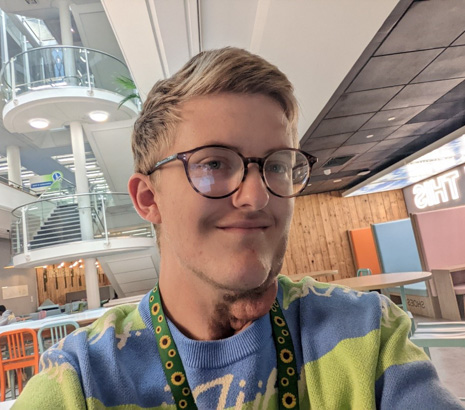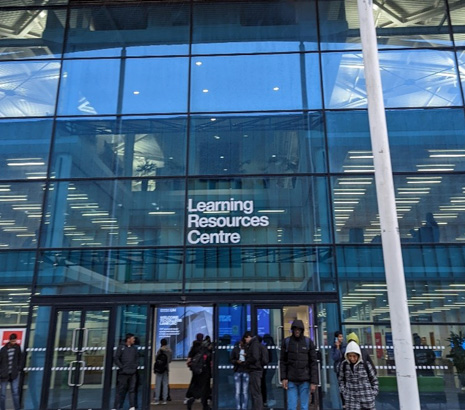BA (Hons) Psychology in Education
Key information
-
Typical offer:
Entry requirements -
Fees: See below
Full details -
UCAS code: X311
-
Institute code: H36

Student Blogs
Katie - Why I love education
What I love most about my course
I loved my course because we learnt Psychology, History of Education, Contemporary Ideas and Philosophy-what is education. In my First Year, to give you a different view what education is about and then you were able to decide if you wanted to general overview of education or be more specific and I chose special education needs as I wanted to understand in more detail about special education needs what it meant in a different context.
In my Second Year, I learnt more about special education needs and what is inclusion I was able to explain what cerebral palsy is to my fellow classmates and we had real-life experiences from other people who had different disabilities talk to us which gave me the opportunity to see it through their eyes and I became to see things differently not everything is as straight forwarded as I first thought.
We were given the chance to have work experience within our modules and I really enjoyed this part of the course as I was able to go back to my old school and do my work experience there as I was able to go to two schools: Lonsdale and Nobel and it were nice to see how much they have changed for the better and I was able to improve their access as they asked my opinion and they have used some of my suggestions that I put forward.
Working with my teacher again was one of the highlights as he said I’m still the same person; passionate about people seeing passed the wheelchair and I have had other students with disabilities come up to me asking who I am and they want to be as confident as I am! This gave me a different idea of what I wanted to do within education, which I will discuss further on.
With the new knowledge that I had gained helped me with my work as a governor as I was able to articulate my views very well and some of my ideas that I have suggested have been used at the school. We were also the opportunity to learn about research and all the terminology, so we had the skills ready for our final year.
Final Year
They say Final Year is the hardest and I totally agree it is but that is the challenge as learning is not always meant to be easy. We only had one lecture a week for the research project in semester A, the rest were seminars to do with Research and Special Educational needs. Research Project was split into two sections: a proposal of our research project and presenting it as a presentation. This gave the tutors insight about how we thought through our question as it had to be a small example due to the time restrictions so that we focused on the question we wanted to answer.
I was grateful for this as I was able to use the proposed plan as my main structure for the writing part in part two which saved me so much time and effort. I would suggest that you use part one of the research as your layout in part two.
On a personal level, my time at Herts has been amazing even with the challenges that I had to face within the university and school of education are an amazing team to be a part of as they supported me to voice my ideas and express them to the relevant people.
As said previously I was passionate about people seeing passed the wheelchair and because of my personal challenges at university. I then realised I wanted to start my own business as a disability awareness coordinator as I feel that I can educate people on how to how to communicate with people with different disabilities. I have my Canine Partner still waiting for my partnership and I will have him work alongside me in this new journey. So, I have new experiences happening in my life after university which is exciting.

Student Blogs
Noah - A day in the life on my psychology course
Hi! My name is Noah and I’m a third year psychology student here at the University of Hertfordshire 👋
Today I’ll be sharing what a typical day looks like for me:
5:30–7:30am: For me, I am definitely an early bird. On days when I have an early morning lecture, I’ll wake up at about half-past five, and spend around forty minutes getting ready for the day. After that, I will start block scheduling a general plan of my day on my calendar.
7:30-8:00am: Just before I arrive at University, I like to quickly stop to grab myself coffee (gingerbread latte with oat milk, if anyone is curious) – caffeine is a must!
8:00-9:30am: Once I arrive at Uni, I head straight to one of the many individual study spaces at the Learning Resource Centre (LRC) to begin some work. The LRC is open 24/7 and hosts thousands of books for every subject that the University teaches. The LRC is such a warm and wonderful environment for studying, with both group and individual study rooms, a café (The Retreat) on the lower-ground floor, as well as comfortable sofa, booths and chairs, allowing you to study in any way that suits you.
I prefer being in almost complete silence, by myself, with little to no distractions, so I absolutely love the individual study spaces.
9:30-10:30am: After my time in the LRC, I have a meeting with my project supervisor. All final year psychology students have to complete a ‘psychology project’, more often known as a ‘dissertation’, and each student chooses a supervisor for their project, often based on previous work.
During my meeting, I'm advised to make a few adjustments to my ethics and risk assessment forms, so I make a quick note to do so on my phone.
11:00-1pm: Straight after my supervision meeting, I have to attend my only lecture for the day. With psychology, there is a lot of independent research that you need to do, so I don’t really have that many lectures that I need to attend. The lecture that I was attending today was on the topic of counselling.
1-3pm: Once the lecture is finished, I make my way back home and have a little bit of a rest. During this time, I also make sure to eat some lunch!
3-5pm: After my break, I jump straight back into work. I begin with making the adjustments to my ethic and risk assessment forms, as I was told to do during my meeting earlier. Once completed, I then start studying for my Counselling module exams.
Once I have completed that, I am absolutely shattered! So I pack everything up and start to relax and unwind.
Thank you for reading my ‘Day in the Life’! This is an example of a very busy day for me, so it is vital to note that not every single day is as hectic as this 😀

Student Blogs
Noah - About the psychology learning facilities and how I use them on my course
Hi, I'm Noah and I’m a final year psychology student at the University of Hertfordshire!
The University has a wide range of facilities geared towards psychology and I'd like to highlight a couple here:
iLab
Within the iLab, located in the Wright Building, is a classroom with over 40 networked, high-end macs. These macs host and run a wide range of software for undergraduate psychology students - SupeLab, SPSS, NVIVO, and Gorilla are just a handful of these softwares. These cannot run on chromebooks, which many students chose to buy before attending university because they are lightweight and have a low price-range, so the iLab allows students to conduct their own independent research.
Personally, I love using the iLab as I find the large screens and fast responsiveness helpful when reading the detailed tables that come with using, for example, SPSS. Additionally, when I must conduct research using other software that I am not so confident on, the smaller room allows me to ask for help easily and quickly from one of my peers, or even the professor.
Learning Resource Centre (LRC)
The LRC, whilst not geared solely towards psychology students, is still a University facility that aids in my work. The quiet environment on floors G-2 helps me when I really need to focus in on something while ‘The Retreat’ in the basement fosters an environment where I can freely and openly discuss situations with my peers without feeling as though I must whisper. Additionally, there are hundreds of psychology books available, so I can easily carry out extra reading when it comes to writing essays – allowing me to secure higher marks for doing so 😀

Alumni Stories
Jake Garwood
Meet Jake Garwood who discovered his passion for teaching and education while studying. He currently works as a Year 4 teacher in a junior school near the University.
Read more stories BA (Hons) Education| Current job role | Year 4 teacher |
|---|---|
| Year of graduation | 2016 / 2017 |
| Course of study | BA (Hons) Education |
| PGCE in Primary Education |
Sparking a passion
Jake decided to go to the University of Hertfordshire based on our 'excellent reputation for teaching training.' His time as a student did not disappoint as his course sparked his passion for education and he says the 'engaging modules at the University and inspiring tutors played a key part in making me the teacher I am today.'
The variety of modules on both of my degrees, from contemporary issues in education to educational technology, from philosophy of education to equality and inclusion, put me in the best possible position to begin my teaching career.'
Aspirations for the future
Jake finds teaching an extremely rewarding career, therefore he does not intend to leave the profession. He says, 'I think it is one of the most rewarding profession available and if you care about the future, then teaching the next generation is one of the best things you can do.'
However, he adds that his ultimate goal is to work towards a Masters in Education, followed by a PhD in the same field. He'd like to keep his options open as to future career paths.'
